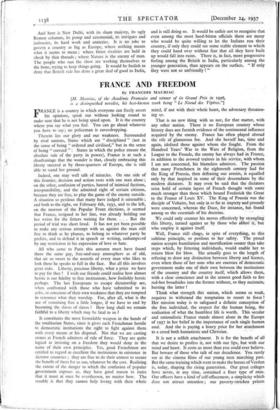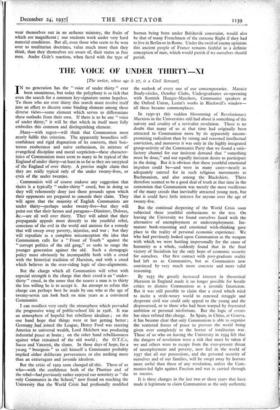FRANCE AND FREEDOM
By FRANCOIS MAURIAC
[M. is a Mauriac, of the Academie Francaise and winner of its Grand Prix in 1926, distinguished novelist, his best-known work being " Le Noeud des Viperes."] FRANCE is a country in which everyone can freely assert his opinions, speak out without looking round to make sure that he is not being spied upon. It is the country where you say what you feel. You can go ahead whatever you have to say ; no policeman is eavesdropping.
Therein lies our glory and our weakness. Surrounded by rival nations, States which are " disciplined " (not in the sense of being " ordered and civilised," but in the sense of being " coerced " : States in which the police ensure the absolute rule of the party in power), France is at such a disadvantage that the wonder is that, closely embracing this liberty sneered at by three-quarters of Europe, she is still able to stand her ground.
Indeed, one may well talk of miracles. On one side of this frontier, decision and action rests with one man alone ; on the other, confusion of parties, hatred of inimical factions, irresponsibility, and the admitted right of certain citizens, -because they are free, to play the game of the enemy outside. A situation so perilous that many have judged it untenable ; and both to the right, on February 6th, 1935, and to the left, on the morrow of the Popular Front elections, it seemed that France, resigned to her fate, was already holding out her wrists for the fetters waiting for them. . . . But the period of trial was short lived. It has not yet been possible to make any serious attempt with us against the man still free to think as he pleases, to belong to whatever party he prefers, and to defend it in speech or writing, unhampered by any restriction in his expression of love or hate.
All who came to Paris this autumn must have found there the same gay, free-and-easy atmosphere as of old, that air so sweet to the nostrils of every man who likes to look those he speaks to full in the face. But all this involves great risks. Liberty, precious liberty, what a price we have to pay for thee ! I wish our friends could realise how almost heroic is our fidelity to free institutions, how foolishly heroic perhaps. The last Europeans to escape dictatorship are, when confronted with those who have submitted to its yoke, so conscious of their own weakness that they are tempted to renounce what they worship. For, after all, what is the use of remaining free a little longer, if we have to end by becoming the slaves of slaves ? How long shall we remain faithful to a liberty which may be fatal to us ?
It constitutes the most formidable weapon in the hands of the totalitarian States, since it gives each Frenchman hostile to democratic institutions the right to fight against them with every means at his disposal. Not that we are casting stones at French admirers of rule of force. They are quite logical in insisting on a freedom they would deny in the name of their own principles. Yes, good Frenchmen are entitled to regard as excellent the institutions in existence in dictator countries ; they are free to do their utmost to secure the benefit of them for us too, whatever be the cost. Realising the extent of the danger to which the confusion of popular government exposes us, they have good reason to insist that it must at once be overthrown, no matter how. The trouble is that they cannot help loving with their whole mind, if not with their whole heart, the adversary threaten- ing us.
That is no new thing with us nor, for that matter, with any other nation. There is no European country whose history does not furnish evidence of the sentimental influence acquired by the enemy. France has often played abroad the role of glamorous foe. And she herself has, time and again, idolised those against whom she fought. From the Hundred Years' War to the Wars of Religion, from the League to the Fronde, the enemy has always had in France, in addition to the avowed traitors in his service, with whom I am not concerned, his blameless admirers. The passion that many Frenchmen in the eighteenth century had for the King of Prussia, then defeating our armies, is equalled only by that inspired in some of their descendants by the modern dictators. It may even be said that the dictators seize hold of certain layers of French thought ' with roots much stronger than those which bound Frederick the Great to the France of Louis XV. The King of Prussia' was the disciple of Voltaire, but only in so far as impiety and prosody were concerned, whereas the Duce, for instance, 'hat fbund among us the essentials of his doctrine. . , We could only counter his moves effectively by strangling this liberty, turned against us by those who abhor it,' but who employ it against itself.
Well, France still clings, in spite of everything, to this sublime principle, so perilous to her safety. The proud nation accepts humiliation and mortification sooner than take steps which, by fettering individuals, would enable her to return blow for blow. She actually goes to the length of refusing to draw any distinction between liberty and licence, even when those of her sons who are enemies of democratic government make one of their own between the institutions of the country and the country itself, which allows them, with a clear conscience and in the utmost goods faith to fire red-hot broadsides into the former without, so they maintain, hurting the latter !
Think what strength this nation, which seems SQ weak, requires to withstand the temptation to resort to force ! Her mission today is to safeguard a definite conception of the free individual, the respect for the human being, the realisation of what the humblest life is worth. This secular and rationalistic France stands almost alone in the Europe of 1937 in her belief in the importance of each single human soul. And she is paying a heavy price for her attachment , . to a creed both humanistic and Christian.
It is not a selfish attachment. It is for the benefit of all that we desire to profess it, not with our lips, but with our mind and heart. It costs us more than you could ever believe. But beware of those who talk of our decadence. You rarely see at the cinema films of our young men marching past. But the same training which went to make the heroes of Verdun is, today, shaping the rising generation. Our great colleges have never, at any time, contained a finer type of man. Our officers have a kind of self-effacement, a simplicity which does not attract attention ; our poverty-stricken priests wear themselves otit in- -an arduous ministry, the fruits of which are'magnificent; our snidents work under very hard material-conditions. But all, even those who seem to be won over to totalitarian doctrines, value much more than they think, than they themselves are aware of, their status as free men. Andre Gide's reaction, when faced with the type of human being born under Bolshevik constraint, would also be that of many Frenchmen of the extreme Right if they had to live in Berlin or in Rome. Under the swirl of enemy opinions this ancient people of France remains faithful to a definite conception of man, which would perish if We ourselves should perish.



































 Previous page
Previous page